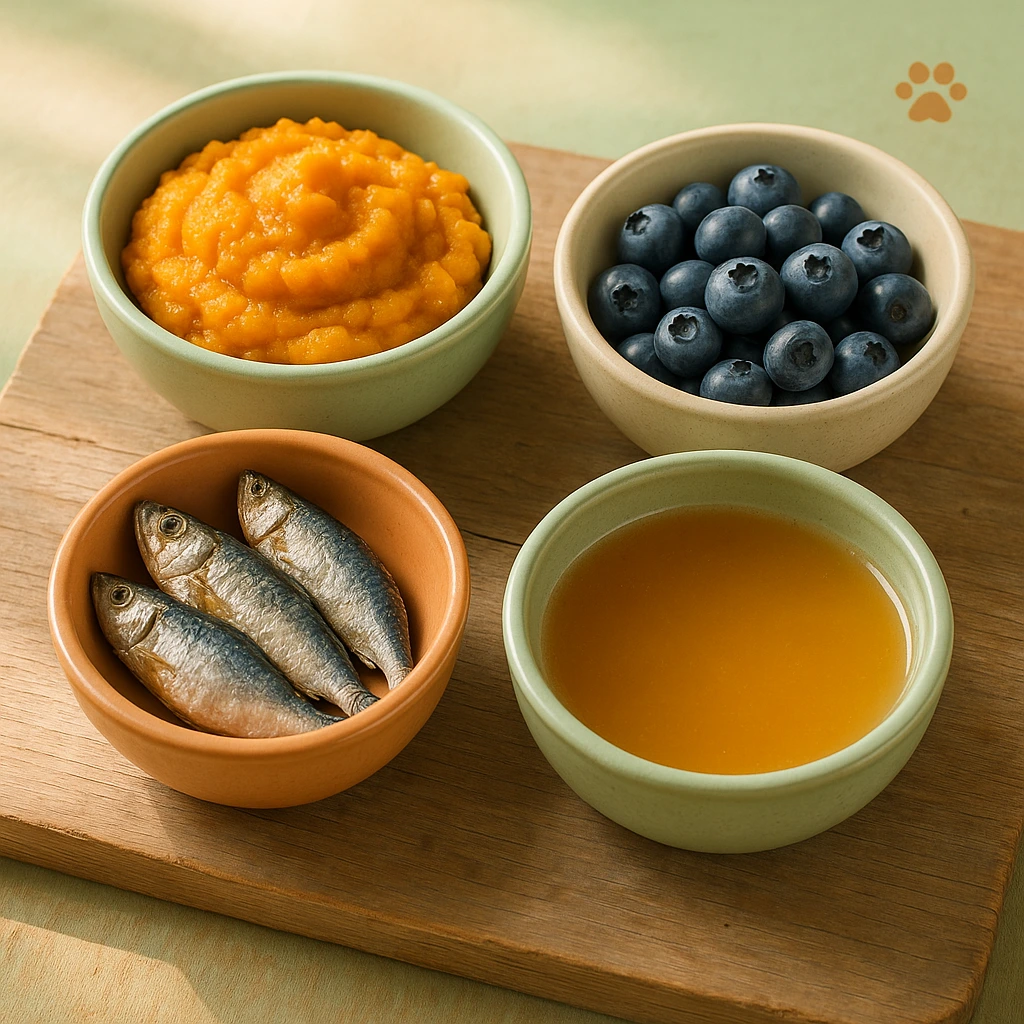15 Dog Superfoods: Vet-Approved Picks for a Healthier, Happier Pup

Feeding your dog well doesn't mean buying the most expensive kibble on the shelf. It means giving them real, nourishing food that supports their unique health needs. If you're looking to add something special to your dog's bowl, here are 15 natural, dog-safe superfoods that can do wonders for their energy, digestion, coat, and more.
15 Healthy Dog Foods to Add to Their Bowl
1. 🦴 Bone Broth
Rich in collagen, gelatin, and minerals, bone broth supports joint health, digestion, and hydration. Just make sure it's unsalted and free of garlic or onions.
2. 🎃 Pumpkin
Packed with fiber and beta-carotene, pumpkin can help regulate digestion and support eye health. Use pure, unsweetened pumpkin puree—not pie filling.
3. 🫐 Blueberries
These antioxidant-rich berries help fight free radicals and support brain health. Serve fresh or frozen as a treat or meal topper.
4. 🐟 Sardines
Full of omega-3 fatty acids, sardines promote skin, coat, and heart health. Choose those packed in water with no added salt or seasoning.
5. 🥛 Greek Yogurt
Unsweetened, plain Greek yogurt is loaded with probiotics for gut health and protein for muscle support. Avoid yogurts with artificial sweeteners.
6. 🍠 Sweet Potatoes
A great source of fiber, vitamins A and C, and minerals, sweet potatoes are gentle on digestion and support immune health.
7. 🥬 Spinach
Spinach is rich in iron, antioxidants, and vitamins. Lightly steam before serving to make the nutrients more accessible.
8. 🥚 Eggs
Eggs are a complete protein source and provide essential amino acids, vitamins, and minerals. Serve cooked and unseasoned.
9. 🥕 Carrots
Crunchy and naturally sweet, carrots are packed with vitamin A and fiber, and they make a great low-calorie snack.
10. 🥥 Coconut Oil
Coconut oil can support skin and coat health and provide a quick energy boost. Start with small amounts to avoid digestive upset.
11. 🍎 Apples
Apples are a source of fiber and vitamin C. Be sure to remove the core and seeds before serving.
12. 𓇢 Chia Seeds
Chia seeds are tiny powerhouses of omega-3s, fiber, and antioxidants. Soak before feeding to aid digestion.
13. 🥦 Broccoli
Broccoli is full of vitamins and fiber, but should be given in moderation to avoid stomach upset. Serve steamed or raw in small pieces.
14. 🍣 Salmon
Cooked salmon is rich in omega-3 fatty acids and protein. Never feed raw salmon, and make sure all bones are removed.
15. 🌿 Kale
Kale contains vitamins A, C, and K, as well as calcium and iron. Offer in small amounts, steamed or finely chopped.
Tips Before You Start
- Introduce new foods gradually to avoid digestive upset.
- Always check with your veterinarian before making major diet changes.
- Feed superfoods as toppers or treats, not as a replacement for balanced meals.
Every Dog Deserves Real Food
Adding superfoods to your dog's diet can make mealtime healthier and more exciting. Start small, observe your dog's reactions, and enjoy discovering their favorites. Want to know what foods best match your dog's unique personality? Take our 🚀 Free Dog Personality Test !
Related Guides
Explore more: Can Dogs Eat This? Safe & Toxic Foods
Feeding basics: How Much to Feed Your Dog
Gut health: Probiotics for Dog Gut Health
FAQ: Dog Superfoods
Q: Can I feed my dog all these superfoods at once?
A: It's best to introduce new foods one at a time and in small amounts. This helps you monitor for
allergies or digestive issues.
Q: Are there any superfoods I should avoid?
A: Yes—avoid grapes, raisins, onions, garlic, and anything with artificial sweeteners like xylitol, as
these can be toxic to dogs.
Q: How much of each superfood should I give?
A: Superfoods should be served in moderation as treats or meal toppers, not as the main meal. Serving
size depends on your dog's size and health.
Q: Can puppies have these superfoods?
A: Many superfoods are safe for puppies, but always consult your vet first to ensure they meet your
puppy's nutritional needs.